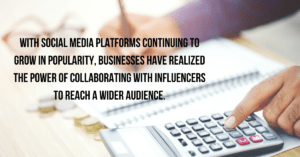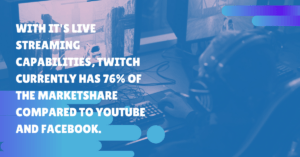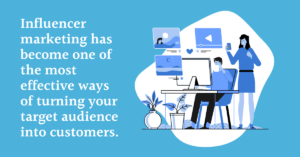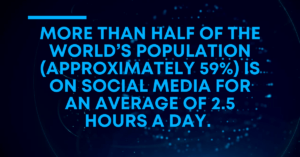When Apple announced that iOS 14.5 would make radical changes to privacy settings in April of 2021, it rocked the world of online advertising. As soon as the update was implemented, it required websites to ask users for permission to track them for advertising purposes. Before the change, websites could simply use cookies to track their users’ behavior. Shortly after that, Google announced similar, but smaller changes were coming for Android users.
While it might be easy to look at the end of easily tracking user behavior and say the sky is falling, it’s not the end of the world for marketers. These vast changes to the digital landscape are creating new opportunities for savvy brands, and the chance to reach and connect with customers in exciting new ways.
In fact, there’s one facet of marketing that stands to massively benefit from these changes: content creators and influencers.
Rapid Growth and Opportunity
Even before the privacy updates in 14.5 happened, influencer marketing was already experiencing exponential growth. Since 2016, the industry has grown from $1.6 billion to $13.6 billion. There are a variety of reasons for this explosive growth: online shopping definitely has played a major role, but the covid-19 pandemic is a clear point where it really took off. When most people were stuck at home all day with nothing to do, influencers had a captive audience. And unlike movie and television studios, which were hamstrung by the pandemic, influencers could continue creating their content without nearly as many obstacles.
While some predictions expected this growth to slow as people began to go outside again, this hasn’t happened. While consumers’ lifestyles have changed back, their viewing habits have not. As viewers consumed influencer content, they gradually adopted it as a larger source of entertainment. In fact, more millennials and Gen Zers watch more videos on social media than they watch movies and television. For Millennials, celebrities like the Rock have a dominant following, while Gen Zers gravitate towards influencers like Mr. Beast, BTS, and Ariana Grande. One notable thing that all of these big names have in common: they have an exceptionally strong social media presence.
When you look at the big picture of what this means for online advertising, it’s clear that trends were already changing to favor influencer marketing. Apple’s iOS 14.5 update to privacy settings simply sped up the process.
Building Better Relationships with Consumers
These changes present advertisers with a clear incentive: move away from the programmatic advertising formula that has served them well for most of the internet’s existence. Instead, they should embrace a more personal approach with consumers. Cookies, while a useful tool, are not a perfect method for connecting with audiences, since they can be prone to error. In many ways, it was a one size fits all method in a marketplace that rewards brands that make more of an effort to reach individuals over the masses.
Without cookies to rely on, marketers will need to look at their traffic less as numbers, percentages, and conversions, and put them back into the shoes of consumers on a journey to a purchase. Did the website visitor just stumble upon your site because of an ad? Are they coming back because they’ve already bought something before and were satisfied with their purchase? Are they coming back for the same product, or are they buying something different because they have confidence in the brand as a whole?
Start a Dialogue
Marketers will have to create a dialogue between themselves and their customers, and find a way to answer these questions. There are a number of options to do this, including email newsletters, polls, and other forms of communication that keep your brand in touch with consumers.
But in terms of opening a dialogue, giving your consumers the information they want from a source they’re more likely to trust, and getting the feedback you can use to better tailor future campaigns? Influencers and creator campaigns should be at the top of any marketer’s list. Especially on the micro-level, your influencers can easily offer their followers reviews and demos that highlight the information and details about your product that consumers care about. It will also allow you to better understand what features matter the most to them.
Influencers are an easy bridge for you to reach out to your targeted consumer base and build a longer-lasting relationship in the long run. Compare that to simply tagging them with a cookie and attempting to understand their behavior from their web browsing habits, and it’s easy to see where the old ways may not actually have been the best ways for marketers.
Lead Gen over Short Term Sales
Another point to consider is the philosophy on the approach your brand should take with your target audiences. Although sales numbers will always be the be-all, end-all of statistics brands should care about, the urgency to find those numbers will need a change in mentality. No cookies, stricter privacy settings, and fewer ways to track consumer habits online mean that your brand will need more buy-in from consumers. As strange as it may seem, harder pushes for short-term sales could hurt your brand in the long term.
For sustained growth as a brand, it will pay off to be patient, and focus on the fundamentals. Marketers will need to redefine who their ideal customers are and identify where their core audiences consume information and entertainment online. They should seek to advertise with publishers that can promise them the kind of web traffic they’re looking to capture with their ads.
From there, a brand can draw in their audiences with compelling content, and storytelling that tells the consumer why your product or service is the one that they want. Influencers are the perfect vehicle to not only drive home the key points you want consumers to know about your product, but also an unmatched resource on building up a relationship built on trust between your brand and your customers.
A more organic, holistic purchasing journey may not provide an immediate boost in sales, but building brand awareness and driving a strong narrative can create a steady stream of growth . The modern consumer is often open to a relationship with your brand, but it has to happen on their terms. Reach out on the right channels with compelling content and stories, and the customers will come.
Beef Up Your Social Media Game
The numbers don’t lie: social media continues to grow as a dominant channel for marketers. In fact, social media has overtaken print advertising to become the third-largest advertising channel. In 2022, your brand almost certainly already has a presence on the social media channels that matter to you. But while it was important to cultivate a social media presence before, now it will become critical. Without cookies to track website behavior, it should play an even larger role in your marketing strategies and campaigns.
No matter the segment of the market you’re looking to reach, social media is a key component to a successful marketing campaign. Outside of personal recommendations, Gen Zers cite TikTok videos as the primary source that influences their purchasing decisions. 53% of women make purchasing decisions based on what they see from influencers on social media. 72% of millennials in general say social media impacts their buying habits.
Influencer marketing campaigns on social media continue to boast a strong ROI compared to other channels, making it a key way to adapt to increased consumer privacy. This is especially true if you vary the size of your influencer to better fit your campaign. It may be tempting to just go with one or two big names to reach your customers, but going with a larger number of micro-influencers can be a better bet for a high conversion rate. Their following is more engaged and more likely to follow up and make a purchase. The content they create is also less likely to come across as a commercial, which is more likely to build engagement with potential customers.
Sideqik Can Help You Adjust Your Strategy
Interested in building out your own influencer campaigns to adapt to the change in privacy settings? Sideqik’s platform allows your brand to not only source the influencers that match your brand’s standards but track their creator campaigns for your products through robust social commerce integrations. We offer an end-to-end suite of services for your influencer campaigns, including over 20+ million influencer profiles that appeal to hundreds of interests. From micro-influencers with intimate access to their audiences with niche interests to mega influencers that are household names with unmatched reach, Sideqik has them all.
Interested in how Sideqik can help you elevate your brand with influencer campaigns and keep you ahead of changes like these? Contact us today for a free demo.
Joshua Smith
Latest posts by Joshua Smith (see all)
- Top LGTBQ+ Influencers to Watch in Pride Month 2022 - June 17, 2022
- How Your Brand Can Find TikTok Influencers To Reach New Audiences - June 14, 2022
- Youtubers That Are Making an Impact on Brands - June 1, 2022







